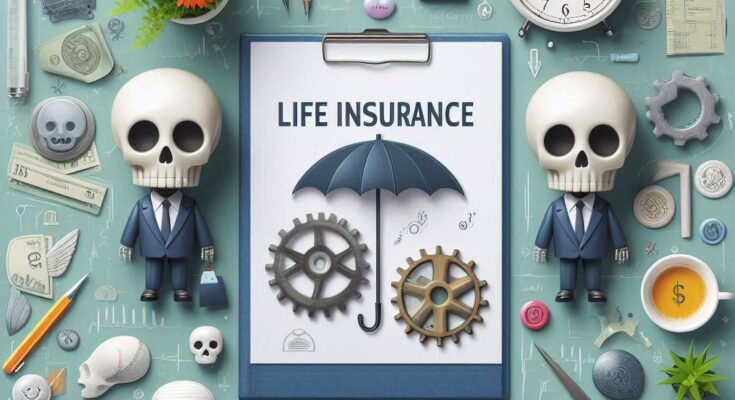Introduction
What is Life Insurance?
In exchange for regular payments, known as premiums, the insurance company promises to pay a sum of money to your chosen beneficiaries after your death. This sum, called the death benefit, can provide financial support to your loved ones during a difficult time.
Why Life Insurance Matters
Life insurance is more than just a financial product; it’s a way to protect your family’s future. It ensures that your loved ones won’t be burdened with financial hardships in your absence. Whether it’s covering funeral costs, paying off debts, or replacing lost income, life insurance provides peace of mind.
Understanding the Basics

How Does Life Insurance Work?
Life insurance is essentially a safety net. You pay premiums to the insurance company, and in return, they promise to pay your beneficiaries a lump sum if you pass away while the policy is active. The policy’s terms and conditions will determine how much is paid and under what circumstances.
Different Types of Life Insurance
Term Life Insurance
It provides coverage for a specific period, or “term,” usually ranging from 10 to 30 years. If you die within this term, the policy pays out the death benefit to your beneficiaries.
Whole Life Insurance
Whole life insurance is a type of permanent life insurance, meaning it provides coverage for your entire life as long as you continue paying premiums. It also has a cash value component that grows over time, which you can borrow against or even cash out if needed.
Universal Life Insurance
You can adjust your premiums and death benefit amounts, and it also has a cash value component that earns interest over time.
Why You Might Need Life Insurance

Protecting Your Loved Ones
The primary reason most people buy life insurance is to provide financial security for their loved ones. If you’re the main breadwinner, your family may rely on your income to cover daily expenses, mortgage payments, and other financial obligations. Life insurance ensures that they can maintain their standard of living even after you’re gone.
Covering Final Expenses
Funeral and burial costs can be surprisingly high, often running into thousands of dollars. Life insurance can cover these expenses, relieving your family of the financial burden during an already difficult time.
Building Cash Value
Some types of life insurance, like whole and universal life, build cash value over time. This cash value can be used as a financial resource during your lifetime, whether for emergencies, retirement, or other needs.
Choosing the Right Life Insurance Policy

Assessing Your Needs
Before choosing a life insurance policy, it’s important to assess your needs. This will help you determine the type and amount of coverage that’s right for you.
Determining the Coverage Amount
How much life insurance do you need? However, your specific situation may require more or less. Consider factors like your debts, living expenses, and future financial needs, such as college tuition for your children.
Comparing Policies
Not all life insurance policies are created equal. It’s important to compare different options, taking into account the premiums, coverage amounts, and any additional features like riders that can enhance your policy. Don’t forget to read the fine print!
How Much Does Life Insurance Cost?

Factors Influencing Premiums
The cost of life insurance varies depending on several factors, including your age, health, lifestyle, and the type of policy you choose. Other factors, like smoking or engaging in high-risk activities, can also increase your premiums.
Ways to Save on Life Insurance
There are ways to save on life insurance without compromising on coverage. Consider buying a policy when you’re young and healthy, as premiums tend to be lower. You can also compare quotes from different insurers to find the best rate.
Common Misconceptions About Life Insurance

“I Don’t Need Life Insurance”
Some people believe they don’t need life insurance, especially if they’re young and healthy. However, life is unpredictable, and having a safety net in place can be crucial for your loved ones.
“It’s Too Expensive”
Another common misconception is that life insurance is too expensive. While some policies can be costly, especially for older individuals or those with health issues, there are many affordable options available, especially if you shop around.
“I Have Coverage Through Work”
While having life insurance through your employer is a great benefit, it might not be enough. Employer-provided policies often offer limited coverage, and you could lose it if you change jobs. It’s worth considering a separate policy to ensure you have adequate protection.
When Should You Get Life Insurance?

Life Events That Trigger the Need
Certain life events make getting life insurance more pressing, such as getting married, having children, buying a home, or starting a business. These events increase your financial responsibilities, making it important to have life insurance in place.
Age Considerations
The younger you are when you purchase life insurance, the more affordable it generally is. Even if you don’t have dependents, buying a policy while you’re young and healthy can lock in lower premiums for the future.
The Application Process
What to Expect When Applying
Applying for life insurance typically involves filling out an application, answering questions about your health and lifestyle, and possibly undergoing a medical exam. The insurer uses this information to assess your risk and determine your premium.
Medical Exams and Questionnaires
Not all life insurance policies require a medical exam, but those that do will typically involve basic health checks like blood pressure, cholesterol levels, and a review of your medical history. Some policies, known as guaranteed issue life insurance, don’t require a medical exam but may have higher premiums.
Choosing Beneficiaries
These are the people who will receive the death benefit when you pass away.
Managing Your Policy Over Time
Reviewing and Updating Your Policy
It’s important to review your policy regularly, especially after major life events like marriage, the birth of a child, or retirement. You may need to adjust your coverage or change your beneficiaries as your circumstances change.
What Happens if You Miss a Payment?
If you miss a premium payment, most insurers offer a grace period, typically 30 days, during which you can make the payment without losing coverage. However, if you don’t pay within this period, your policy could lapse, meaning you would lose your coverage.
What Happens When a Claim is Made?
How to File a Claim
When a policyholder passes away, the beneficiaries need to file a claim with the insurance company to receive the death benefit. This typically involves submitting a claim form and a copy of the death certificate.
What Beneficiaries Should Know
It’s important for beneficiaries to know about the life insurance policy and where to find the necessary documents. Clear communication can prevent delays in processing the claim and ensure that the death benefit is paid out promptly.
Conclusion
It provides peace of mind, knowing that your loved ones will be taken care of if something happens to you. Whether you’re just starting to explore your options or are ready to buy a policy, understanding the basics of life insurance is the first step in making an informed decision.
FAQs
What Happens if I Outlive My Term Life Insurance Policy?
If you outlive your term life insurance policy, the coverage simply expires. You won’t receive any money back, but you can choose to renew your policy, buy a new one, or convert it to a permanent life insurance policy.
Can I Have Multiple Life Insurance Policies?
Yes, you can have multiple life insurance policies. Some people choose to have a combination of term and permanent policies to meet different financial needs.
How is the Death Benefit Paid Out?
The death benefit is typically paid out as a lump sum, but some policies offer other options, such as installment payments or an annuity.
Can I Change My Beneficiaries After Purchasing the Policy?
This is particularly important after major life changes like marriage, divorce, or the birth of a child.
What If I Miss a Premium Payment?
Most policies offer a grace period for missed payments. If you pay within this period, your coverage will continue. However, if you don’t, your policy could lapse, meaning you would lose your coverage.



